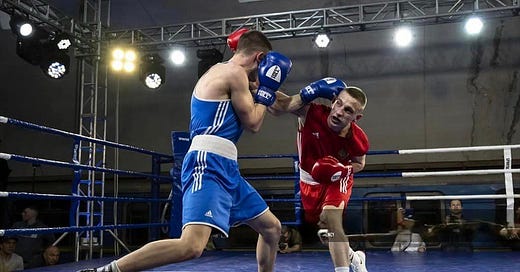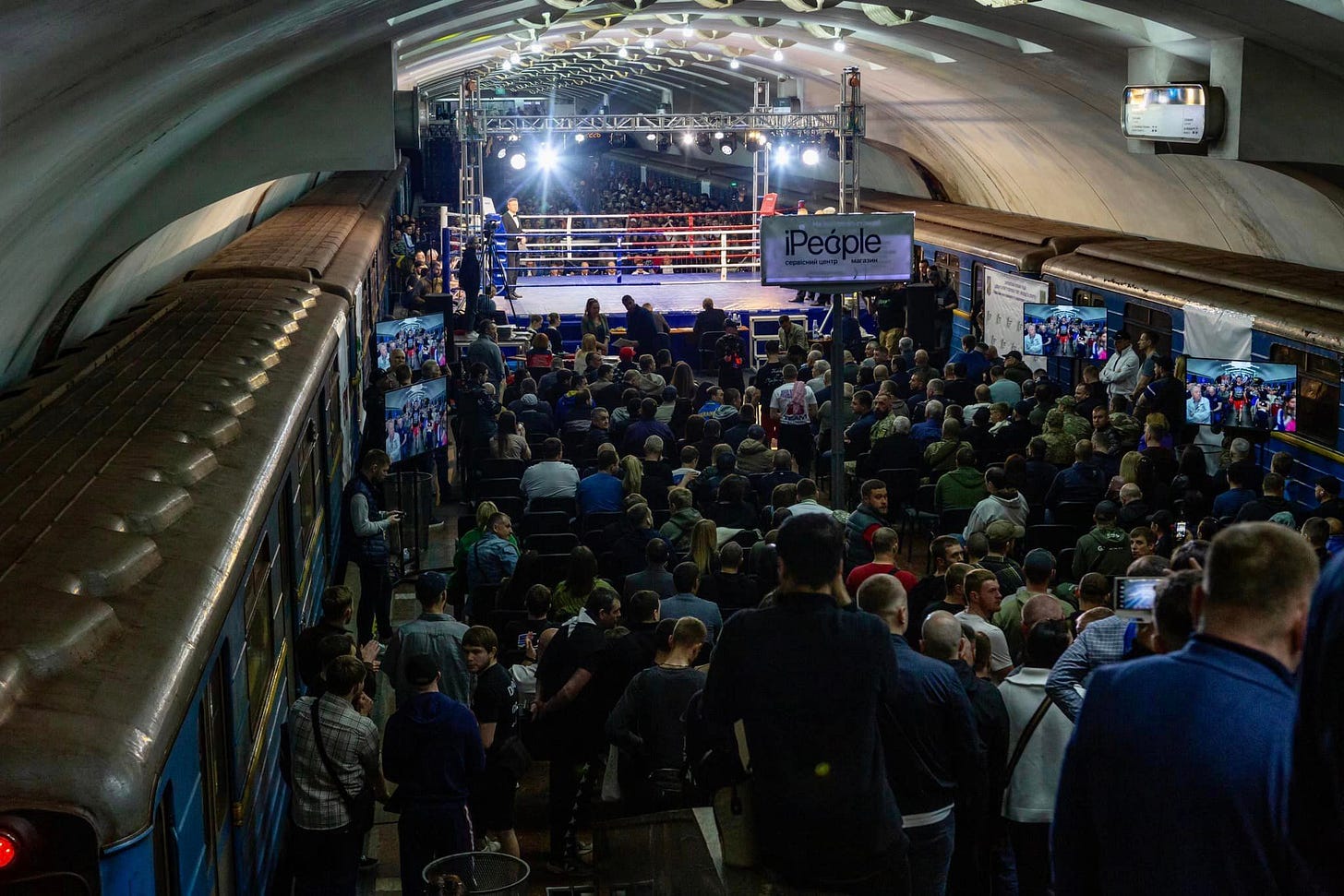Boxing finds home in Ukraine's underground
A boxing tournament featuring Ukraine’s Olympic team took place in a subway station in war-torn Kharkiv.
Nearly 15 months after Russia launched its invasion of Ukraine, boxing returned to the war-torn nation with a unique event held in an underground subway station.
The event, which took place last weekend, featured an array of amateur boxers, including members of Ukraine’s Olympic boxing team, and was dedicated to the “heroes of Kharkiv”—a city in eastern Ukraine that has been under constant bombardment by Russian forces since the start of the war. The decision to hold the event in the Zakhysnykiv Ukrainy metro station was, understandably, due to the city’s continued role in the frontlines of the war.
Despite the security concerns—Kharkiv lies approximately 19 miles south of the Russian border—the event attracted hundreds of civilian fans (and military personnel) looking to enjoy a night of amateur fights.
“The Boxing Federation wants to show this event that sport exists in Kharkiv,” said Oleksandr Manchak, vice president of Ukraine’s Boxing Federation. "We are starting to return to life in our city, adjusting to the conditions that are present, but in doing so, we are only moving forward.”
The boxing event was an act of defiance—a concerted action aimed to send a message to Russia: You can invade our country and bomb our city, but we’s still here. This strategic attempt to use combat sports to display strength and solidarity is a tactic that Ukraine has repeatedly utilized since the start of the war.
As Russia launched its invasion in February 2022, several of the country’s top boxers were forced to put their professional careers on hold to take part in the conflict. Oleksandr Usyk, the Ukrainian Olympic medalist and heavyweight champion, joined the Kyiv Territorial Defense while fellow world champion while Olympic gold medalist Vasiliy Lomachenko gave up a title shot to take up arms for Ukraine. Even Vitali Klitschko, the former heavyweight boxing champion once known as Dr. Ironfist, has served as mayor of the Ukrainian capital of Kyiv since 2014 and is now one of the country’s most recognizable symbols of resistance to Russian rule.
While Usyk and Lomachenko’s military service was short-lived, it served the purpose of presenting a unified Ukraine that is defending itself against an invading enemy. Even the country’s elite boxers were willing to risk their lives. It was evocative symbolism at a time when Ukraine was campaigning for support and sympathy from the rest of the world.
In August 2022, Usyk made his return to boxing and successfully defended his WBA, IBF and WBO heavyweight titles in a rematch against Anthony Joshua. Ahead of the bout, the champion stated candidly that he had been persuaded to take the fight after visiting soldiers who were injured on the frontlines.
“I went to the hospital where soldiers were wounded and getting rehabilitation from the war,” Usyk said. “They were asking me to go, to fight, to fight for the country, fight for your pride and if you’re going to go there, you’re even going to help more for our country.”
Usyk’s statement shed light on yet another interesting form of utility that Ukraine has derived from boxing: nationalism.
It goes without saying that Usyk is far more useful to Ukraine as a dominant champion rallying support in the midst of a war than as cannon fodder on the front lines. Ahead of his fight with Joshua, Usyk took part in the pre-fight press conference dressed in a traditional Ukrainian Cossak outfit and sporting a single lock of hair (known as osedelts) on his otherwise fully-shaven head. “You should know that Cossack oseledets haircut and hopak on the ring are not simply part of image for me, they are a tribute to our history and culture,” he said.
While Ukraine has been able to utilize Usyk to engage in strategic soft power—shaping the preferences of others through appeal and attraction through vessels like sports and culture—other boxers have not been as fortunate.
In June 2022, Oleg Prudky became the first Ukrainian boxer to die on the frontlines of the war. Prudky was a two-time amateur boxing champion and was working for the police in his local region of Cherkasy as part of the special forces when he was killed. Maksym Galinichev, a Ukrainian boxer who medaled at the 2018 Summer Youth Olympic Games, was killed in action in March 2023.
Nevertheless, the recent boxing event in Kharkiv has drawn support from key figures in the international boxing community, including Boris van der Vorst, the former president of the Dutch Boxing Federation who unsuccessfully challenged Russia's Umar Kremlev for the International Boxing Association (IBA) Presidency last year. He has since gone on to play a key role in the creation of a breakaway boxing association that plans to rival the IBA.
(Author Note: I wrote about the ongoing civil war in boxing here)
Boxing’s Civil War
On Sunday, April 30, International Boxing Association (IBA) President Umar Kremlev stood before a raucous crowd at the Humo Arena in Tashkent, Uzbekistan, to commence the opening ceremony for the Men’s World Boxing Championships. “I declare the World Championsh…
The IBA stirred controversy last year by allowing Russian boxers to compete with their flag and national anthem despite the ongoing invasion. Ukraine responded by boycotting the event, and the IBA-hosted World Boxing Championships. World Boxing, on the other hand, has shown support for Ukraine amidst the ongoing discourse over whether Russian athletes should be allowed to return to the international sports arena.
"Ukrainian boxers, forced by the IBA to miss the World Championships, stepped into the underground ring and showcased their true fighting spirit," Van der Vorst said on Twitter. “The Dutch boxing community stands firmly in solidarity with the Ukrainian Boxing Community...”
Ukraine has a rich and storied history in boxing, one that has found new meaning in the wake of the war. Far beyond just a source of gold medals and bejeweled title belts, boxing has emerged as a one-two punch combination of statecraft and resistance.








Great article.
Just I would not have used the term "cannon fodder" here:
> "It goes without saying that Usyk is far more useful to Ukraine as a dominant champion rallying support in the midst of a war than as cannon fodder on the front lines."
Ukrainian army values the lives of their soldiers. Even if some battles are very risky, I just don't think this term applies.